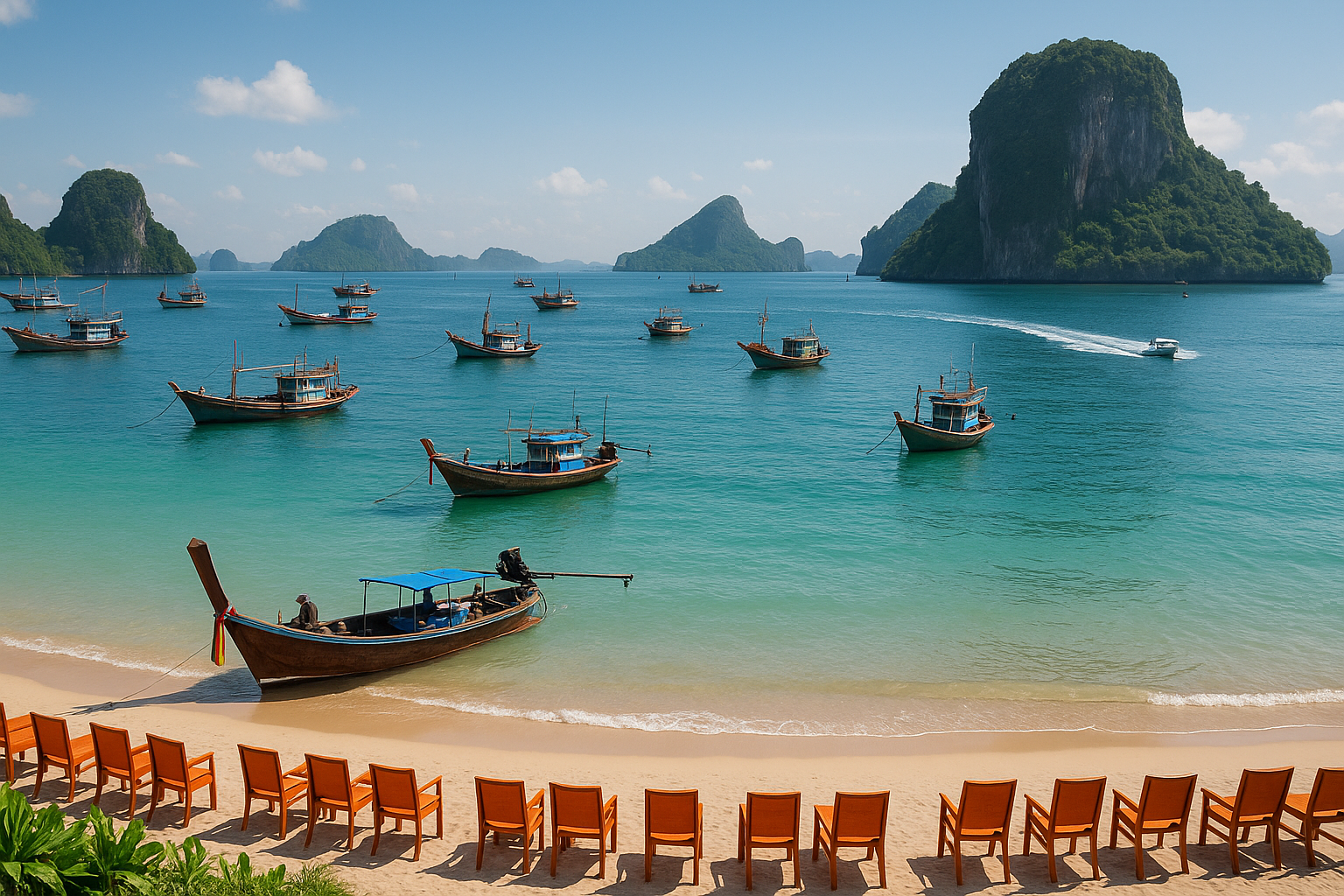Navigating the Blue Economy: Thailand’s Vision for Marine Spatial Planning Success
The report outlines a comprehensive national Marine Spatial Planning (MSP) framework to sustainably manage Thailand’s marine resources by integrating environmental protection, economic development, and social inclusion. It recommends establishing a centralized coordination unit, inclusive stakeholder engagement, and data-driven adaptive planning.

Envirostat, the Department of Marine and Coastal Resources (DMCR), the Ministry of Natural Resources and Environment (MNRE), and the World Bank, supported by funding from the PROBLUE trust fund, have collaboratively developed the report "Developing a National Marine Spatial Planning Framework for Thailand’s Sustainable and Resilient Blue Economy." Drawing on extensive assessments, pilot initiatives, and international best practices, the report offers a comprehensive national blueprint for ocean governance. It aims to help Thailand transition from fragmented coastal management to a unified, strategic Marine Spatial Planning (MSP) framework. With over 3,150 kilometers of coastline and marine ecosystems increasingly threatened by pollution, overfishing, habitat degradation, and climate change, the country now stands at a critical juncture between escalating crisis and transformative opportunity.
Thailand has already made notable progress. More than 15% of its Exclusive Economic Zone (EEZ) is currently managed using ecosystem-based methods, including 26 national marine parks and 160 mangrove reserves. Yet marine and coastal management remains fragmented, often reactive, and poorly integrated across sectors. Pilot MSP projects in Koh Larn, Koh Sichang, and Phang Nga Bay provided valuable insights into zoning tools, stakeholder involvement, and conflict resolution, but revealed significant barriers to scalability, chiefly a lack of institutional coherence and sustainable funding.
National Coordination: From Pilots to Policy
To bridge this gap, the report recommends establishing a centralized MSP Coordination Unit under either the Office of the Prime Minister or the MNRE. This unit would oversee the design and execution of a national MSP Action Plan, supported by expert working groups on zoning, data management, monitoring, stakeholder engagement, and conflict resolution. The proposed institutional architecture ensures inter-agency coherence, drawing in actors such as GISTDA, the NSC, Royal Thai Navy, and the National Economic and Social Development Council.
Six alternative models for marine spatial planning are presented, ranging from a single nationwide plan to coastal and EEZ zoning managed at the provincial or regional cluster level. Each option is evaluated based on ecological specificity, enforcement feasibility, and stakeholder inclusion. Zoning is positioned as the centerpiece of the spatial management strategy, with categories ranging from strict conservation (no-take zones) to multiple-use and special-use areas. The framework is designed to be adaptive, able to evolve as ecological conditions, economic priorities, or scientific knowledge change.
Empowering People: Equity and Gender at the Core
The report makes it clear that MSP success will depend not only on institutional structures and data systems but also on inclusive stakeholder participation, particularly among women, small-scale fishers, youth, the elderly, and migrants. Thailand already has a strong legal foundation for gender equality, including the Gender Equality Act (2015) and the Gender Equality Promotion Fund. However, these commitments must now be translated into MSP policy and practice.
Practical recommendations include collecting gender-disaggregated data, appointing gender focal points in implementing agencies, supporting alternative livelihoods through training, and embedding gender-responsive budgeting into the MSP process. By doing so, the framework not only meets equity goals but also strengthens its legitimacy, reduces conflict, and ensures that policies reflect the diversity of those who depend on marine resources for their livelihoods.
Data-Driven Decisions for a Dynamic Ocean Future
At the heart of the proposed MSP process lies a strong commitment to evidence-based planning. Thailand’s data infrastructure, including GISTDA’s Marine GI Portal, the Marine Knowledge Hub, and the National Statistical Office’s Ocean Accounts initiative, offers a powerful toolkit for mapping marine assets, tracking environmental trends, and integrating socio-economic indicators into decision-making.
The report outlines how data should be used at every stage of the MSP cycle: from initial baseline assessments and zoning to long-term monitoring and evaluation. Ocean Accounting, in particular, is highlighted as a key innovation that can bring transparency and rigor to MSP by tracking resource flows, ecosystem services, and human impacts in a standardized way. To maintain data quality and ensure accessibility, the Coordination Unit will need sustained investments, inter-agency cooperation, and continuous training for relevant personnel.
Building a Resilient, Adaptive, and Inclusive Marine Economy
Finally, the report lays out a five-step implementation roadmap: define a clear vision and guiding principles; delineate spatial boundaries and jurisdictional responsibilities; establish implementation structures; develop and fund an MSP action plan; and roll out inclusive, continuous stakeholder engagement. It emphasizes that monitoring, evaluation, and adaptive management must not be afterthoughts but core elements of the process. Indicators should span national and sub-national levels, assessing legal compliance, biodiversity health, job creation, and alignment with international obligations such as SDG 14 and the UNFCCC.
If implemented as envisioned, this national MSP framework will help Thailand unlock the full potential of its blue economy, balancing ecological integrity, economic opportunity, and social equity. More than just a technical planning tool, it represents a political commitment to steward marine resources wisely for generations to come. With leadership, coordination, and sustained investment, Thailand has the chance to emerge as a regional model in sustainable and inclusive marine spatial planning.
- FIRST PUBLISHED IN:
- Devdiscourse
ALSO READ
Buddhist Monks Scandal Shakes Thailand: Unveiling Secrets and Financial Exploitation
Thailand's army says armed clashes with Cambodia have killed at least nine civilians and injured 14 others, reports AP.
Thailand says at least 1 civilian was killed amid fresh clashes and airstrikes along the Thailand-Cambodia border, reports AP.
Tensions Flare: Thailand and Cambodia's Dueling Artillery
U.S. Calls for Immediate Peace in Thailand-Cambodia Tensions










